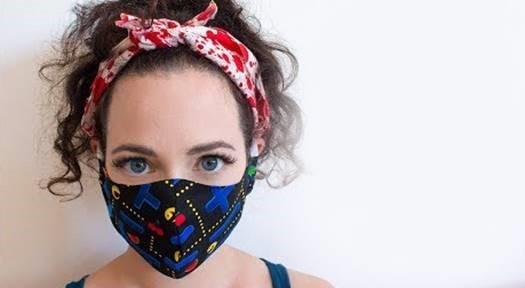Why Shut Down? COVID-19 Infections Would Plummet If 80% Of Americans Just Wore Masks According To Study
by
Tyler Durden
Sat, 05/09/2020 - 16:05
Despite what the
World Health Organization and Dr.
Anthony Fauci tell you, a new study has concluded that
if 80% of Americans were to wear a mask, COVID-19 infections would drop by more than 90%.

And as
Vanity Fair notes, consider this;
The day before yesterday,
21 people died of COVID-19 in Japan. In the United States, 2,129 died. Comparing overall death rates for the two countries offers an even starker point of comparison with total U.S. deaths now at a
staggering 76,032 and Japan’s fatalities at 577. Japan’s population is about 38% of the U.S., but
even adjusting for population, the Japanese death rate is a mere 2% of America’s.
This comes despite Japan having no lockdown, still-active subways, and many businesses that have remained open—reportedly including karaoke bars, although Japanese citizens and industries are practicing social distancing where they can.
Nor have the Japanese broadly embraced contact tracing, a practice by which health authorities identify someone who has been infected and then attempt to identify everyone that person might have interacted with—and potentially infected. So how does Japan do it?
So what is Japan doing differently?
"
One reason is that nearly everyone there is wearing a mask," said UC Berkeley computer scientist De Kai, the chief architect of an in-depth joint study with Hong Kong University.
Kai's study suggests that
every one of us should be wearing a mask - be it homemade, surgical, scarf or bandana, like the Japanese are doing along with other (mostly East Asian) countries.
The mask debate, of course,
has been raging for weeks in the States and globally. Pro-maskers assert that the widespread use of face coverings can diminish the spread of COVID-19.
Some anti-maskers, including various politicians and public health officials, have insisted that there is no proof of the efficacy of face guards. According to some activists, a blanket mask mandate places a limit on individual liberty and even one’s right to free speech. (Pro-mask advocates are fighting back with #masks4all and #weara****ingmask Twitter campaigns).
Representatives of the World Health Organization have also been sounding rather anti-mask, fretting that many people won’t wear masks properly, thereby risking infection, or that masks will give people a false sense of security and encourage risky behavior, such as partying up close and personal—none of which seems to have played out, as far as we know, in Japan or Hong Kong or other mask-wearing places. Adding to the brouhaha has been the shortage of medical masks for doctors, nurses, bus drivers, and the guy who delivers burritos to your door. -
Vanity Fair
"I felt like this was pretty urgent," said De Kai - the son of Chinese immigrants who was born in St. Louis. "I saw the country where I grew up, where my family lives [now mostly in the Bay Area], about to face this pandemic without knowing much about something as simple as wearing a mask to protect themselves and others."
Kai built a forecasting computer model called the
masksim simulator, which uses sophisticated models used by epidemiologists to track outbreaks of various pathogens such as SARS, Ebola and COVID-19, and simulate the effect of wearing masks on infection rates. It incorporates randomness and unpredictability inherent to human behavior, such as when an infected person decides to drop everything and take off to the beach for a dose of Vitamin D. Kai's team also added their own variables,
such as how effective different masks are at blocking aerosolized droplets of coronavirus.
Along with the
masksim site,
the team is also releasing a study that describes their model in detail as well as their contention that masksim’s forecasts support a growing body of pro-mask evidence. “What’s most important about wearing masks right now,” said
Guy-Philippe Goldstein, an economist, cybersecurity expert, and lecturer at the Ecole de Guerre Economique in Paris—and a
masksim collaborator, “is that it works, along with social distancing, to flatten the curve of infections as we wait for treatments and vaccines to be developed—while also allowing people to go out and some businesses to reopen.”
While all models have limitations and are only as good as their assumptions,
this one is “a very thorough model and well done,” said
William Schaffner, an infectious disease specialist at Vanderbilt University, who reviewed the De Kai team’s paper. “It supports a notion that I advocate along with most other infectious disease experts: that masks are very, very important.”
Jeremy Howard, founding researcher at
fast.ai and a distinguished research scientist at the University of San Francisco, also assessed the paper.
“It’s almost overkill how careful they were with this modeling,” said Howard, who also coauthored and spearheaded
a study last month (recently submitted to the journal PNAS) that reviewed dozens of papers assessing the effectiveness of masks. -
Vanity FairSo, is it time to reopen the economy and simply mask up until COVID-19 is no more?
https://www.zerohedge.com/health/why...asks-according





 Reply With Quote
Reply With Quote


